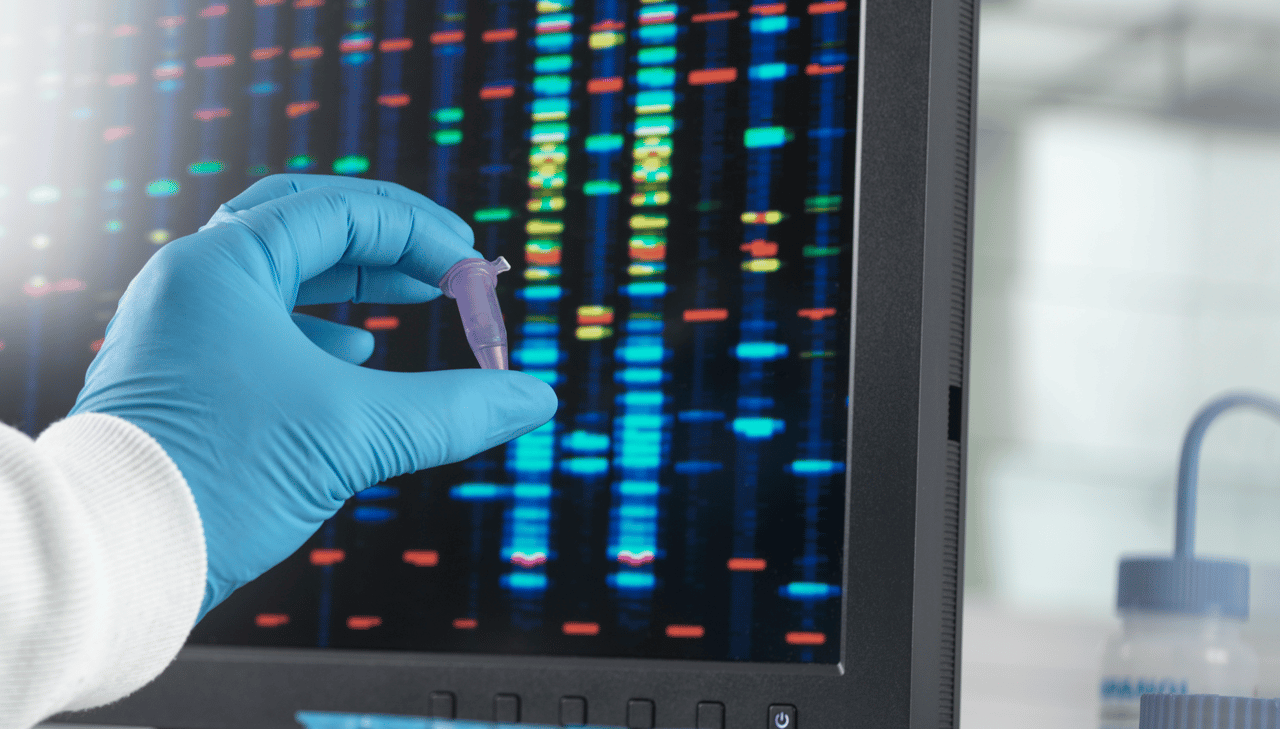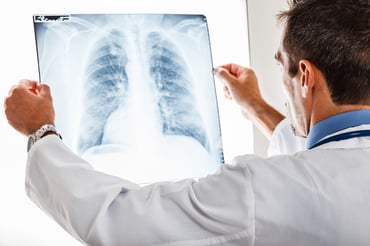
Lung cancer is the third most common cancer in the United States among both men and women. Thankfully, fewer people are dying every year thanks to lung cancer screening for smokers (including previous smokers) and advancements in lung cancer treatment options. More people are living longer, fuller lives after a diagnosis.
The advancement in treatment options results from a better understanding of the human DNA and how changes in genes can lead to the development of various cancers. Drugs are now available to target specific gene mutations for several types of cancer, including non-small cell lung cancer.
This category of drugs is called targeted therapy. Also called precision medicine, they focus on blocking the overgrowth of cancer cells by targeting specific genetic changes. These changes are identified through biomarkers.
What Are Biomarkers and How Are They Identified?
Biomarkers, also known as biological markers or molecular markers, are substances such as genes, proteins, and hormones found in cancer cells, surrounding tissue, and bodily fluids like blood. They help your cancer doctor determine if a tumor is present and better understand its characteristics.
Biomarker testing involves searching for genetic changes or specific substances, such as proteins, linked to cancer growth. Your doctor may perform a tissue biopsy or draw blood and then send it to a laboratory to analyze.
The test results will provide a "tumor profile" that the oncologist can use to understand better if there is a specific gene linked to the cancer’s growth. Thanks to clinical research, a category of drugs called targeted therapy is now available. Each drug focuses on a particular genetic change to slow the growth of cancer cells.
Using Biomarker Testing as Part of Lung Cancer Care
There are two primary types of lung cancer: small cell and non-small cell lung cancer. Biomarkers can be used to diagnose and direct the treatment of non-small cell lung cancer (NSCLC), the most common type of lung cancer. Biomarker testing is not typically performed for patients with squamous cell carcinoma, a specific subtype of NSCLC, or for small cell lung cancer.
The biomarker tests identify specific proteins and mutations that send certain signals to the cells, causing cancer to grow. These mutations are primarily acquired, meaning environmental factors and exposure to substances such as cigarette smoke caused them. In some cases, the mutations can be inherited.
There are two main types of lung cancer biomarkers: mutations that encourage cancer cell growth and immune response biomarkers.
- Mutations include rearrangements, skipping, and protein overproduction that cause cancer to grow. Targeted therapies are now available for some of these mutations, and others are being developed.
- Immune response biomarkers can predict how well your cancer will react to immunotherapy drugs, which stimulate your immune system to fight cancer.
Both targeted therapy and immunotherapy have advanced greatly in the past decade, thanks to clinical research. Targeted therapy and immunotherapy are often used in combination with other treatments such as chemotherapy, surgery, and radiation therapy.
How Lung Cancer Biomarkers Influence Your Treatment Plan
Oncologists can tailor treatment plans based on biomarker test results. While biomarker testing may be done at the initial diagnosis of non-small cell lung cancer, some of the targeted therapy treatments are available only to patients who have recurrent disease or for whom the standard first line of treatment did not work.
Gene mutations can lead to unchecked growth of lung cells, as well as a multiplication of proteins that could cause the tumor to grow. It is possible that more than one gene is changed.
The Food and Drug Administration (FDA) has approved targeted therapy for tumors to treat non-small cell lung cancers that exhibit these biomarkers:
- EGFR mutation
- ALK gene rearrangement
- ROS1 rearrangement
- BRAF V600E mutation
- NTRK fusion
- MET amplification or MET exon 14 skipping
- RET rearrangements
- PD-L1 (an immune response biomarker)
TP53
The TP53 gene reduces your risk of cancer by preventing cell replication. Mutations in this gene are present in 50% of non-small lung cancer patients. Clinical research is currently in progress to counter the mutation and slow the growth of cancer cells.
EGFR
The EGFR mutation is the most common, found in about 23% of non-small cell lung cancer patients. The epidermal growth factor receptor (EGFR) gene determines how cells grow and divide. A mutation of this gene can lead to uncontrollable cell replication. Patients whose lung cancer is related to an EGFR mutation are typically diagnosed with an EGFR-positive cancer. There are drugs available, called EGFR inhibitors, that block the signal from the mutated EGFR gene so that the cancer cells will slow or stop growing.
KRAS
The KRAS gene controls cell replication and differentiation. Mutations in this gene are found in approximately 30% of non-small lung cancer patients, especially those with a history of smoking. Among these patients, about 13% of them have a specific type of KRAS gene change called a KRAS G12C mutation. KRAS inhibitors are available to slow the cancer’s growth for these patients.
There Are No Biomarkers Showing a Genetic Mutation. Now What?
If a non-small cell lung cancer patient does not test positive for any biomarkers, the oncologist will recommend another set of treatments expected to give you a positive outcome. When possible, a clinical trial may be recommended because you qualify to participate. Clinical trials are essential for developing new therapies, and they allow patients access to the latest NSCLC treatments.
Lung Cancer Treatment at New York Oncology Hematology
The New York Oncology Hematology cancer centers are ready to help patients with a lung cancer diagnosis. Our oncologists are here to answer your biomarker testing questions and provide a treatment plan tailored to your needs. We also offer clinical research trials to our patients who qualify, making the latest-breaking treatments available to our patients in the Capital District.
If you or a loved one was recently diagnosed with lung cancer, the team at NYOH is here to help. Request an appointment with one of our lung cancer specialists throughout the Capital District, including Albany, Troy, Amsterdam, Clifton Park, and Hudson, NY.


